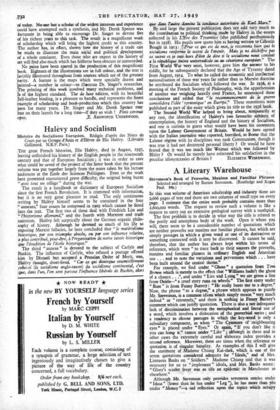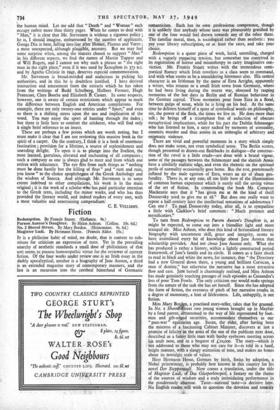A Literary Warehouse
IN this vast volume of American scholarship and industry there are ;666 pages of text and there are two columns of small type on every page. I estimate that the entire work probably contains more than 2,600,000 words. The request to review such a volume is like a request to carry out an extensive geological survey with a toothpick. The first problem is to decide in what way the title is related to the portly and amorphous body of the work. Open it where you will, there seem to be a considerable number of quotations which are neither proverbs nor maxims nor familiar phrases, but which are simply passages in which a given word or one of its derivatives or something connected with it may be diScovered. It cannot be said, therefore, that the author has always kept within his terms of reference, which were " to trace back to their so rtes the proverbs, maxims and familiar phrases in ordinary English and American use . . . and to note the variations and perversions which . . . have been built around the central theme.'
For example, we find under "Ghost" a quotation from Tom Brown which is merely to the effect that " Williams hadn't the ghost of a chance . . .", and under " Lies and Lying " we arc given a line from Ottida—" a cruel story runs on wheels." The first entry under " Bore " is from Fanny Burney : "He really bores me to a degree." Now, the phrase " to a degree," a phrase which appears to puzzle Mr. Stevenson, is a common idiom which simply means," very much indeed " or " extremely," and there is nothing in Fanny Burney's comment which can justify quotation. There is also a not infrequent lack of discrimination between the metaphorical and literal use of a word, which involves a dislocation of the proverbial series ; and a tendency to choose passages in which the key-word is only a subsidiary component, as when " The Cynosure of neighbouring eyes" is placed under "Eyes." Or again, "If you don't like it you can lump it " comes under " Like " • akhough in these and in other cases the extremely careful and elaborate index provides a second reference. Moreover, there are times when the reference or quotation is of singular banality. As examples of this I will give the statement of Madame Chiang Kai-shek, which is one of the seven quotations considered adequate for " Ideals," and of Mrs. Linnaeus Banks on " Soldiers." Madame Chiang said that it was necessary for us to " implement " ideals, and Mrs. Banks wrote: " Glory's scarlet- fever was as rife an epidemic in Manchester as elsewhere."
Although Mr. Stevenson only provides seventeen entries under " Ideas " (fewer than he has under " Leg "), he has more than 36o under "Money "—a. sad reflection upon the topics which occupy
the human mind. Let me add that " Death " and " Woman" each occupy rather more than thirty pages. When he comes to deal with " Man," it is clear that Mr. Stevenson is without a rigorous policy ; he is, I should imagine, embarrassed by the number of applicants. Gunga Din is here, falling into line after Homer, Plautus and Varro ; a most unexpected, although plausible, ancestry. But we may feel some surprise when, among the sources chosen to support " Man " in his different aspects, we find the names of Martin Tupper and of Will Rogers, and I cannot see why such a phrase as " the right man in the right place," even if it was used by Xenophon in 375
and by Agatha Christie in 1941, deserves especial commemoration.
Mr. Stevenson is broad-minded and audacious in picking his authorities, and in this he is doubtless justified. I have derived instruction and amusement from the extracts which he has taken from the writings of Budd Schulberg, Hulbert Footner, Hugh Pentecost, Clare Boothe and Elizabeth B. Custer. In some respects, however, one is aware of certain restrictions which appear to mark the difference between English and American compilations. For example, there are only twenty-one entries under " Sport," and even so there is a shifting stress upon the use and implication of the word. You may enjoy the sport of hunting through the index ; but there is little here to comfort the cricketer, who will find only single brief reference to an insect.
These are perhaps a few points which are worth noting, but I must make it clear that I am not reviewing this massive book in the spirit of a carper. On the contrary, I think it is a book of enormous fascination ; provision for a lifetime, a source of replenishment and unending delight. To open it is to plunge into the liveliest, the most learned, garrulous, elevated and enchanting of all companies ; such a company as one is always glad to meet and from which one retires with reluctance. The eye flits from such things as " nothing must be done hastily but the killing of fleas " and " rum and ruin, you know " to the choice apophthegms of the Greek Anthology and the wisdom of Seneca. And although Mr. Stevenson is to some extent indebted to other compilations, his work is in the main original; is the work of a scholar-*ho has paid particular attention to the reek texts, including the minor works, and who has thus provided the literary world, and indeed readers of every sort, with a most valuable and entertaining compendium:
C. E. VULLIAMY.







































 Previous page
Previous page